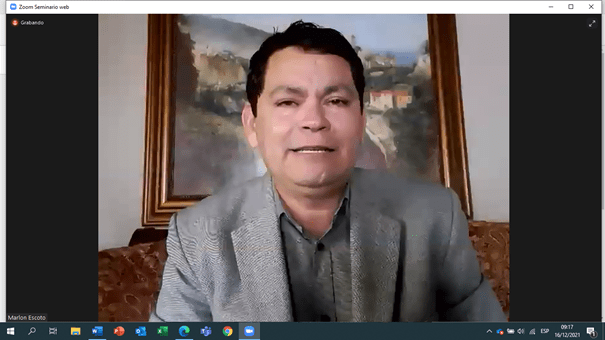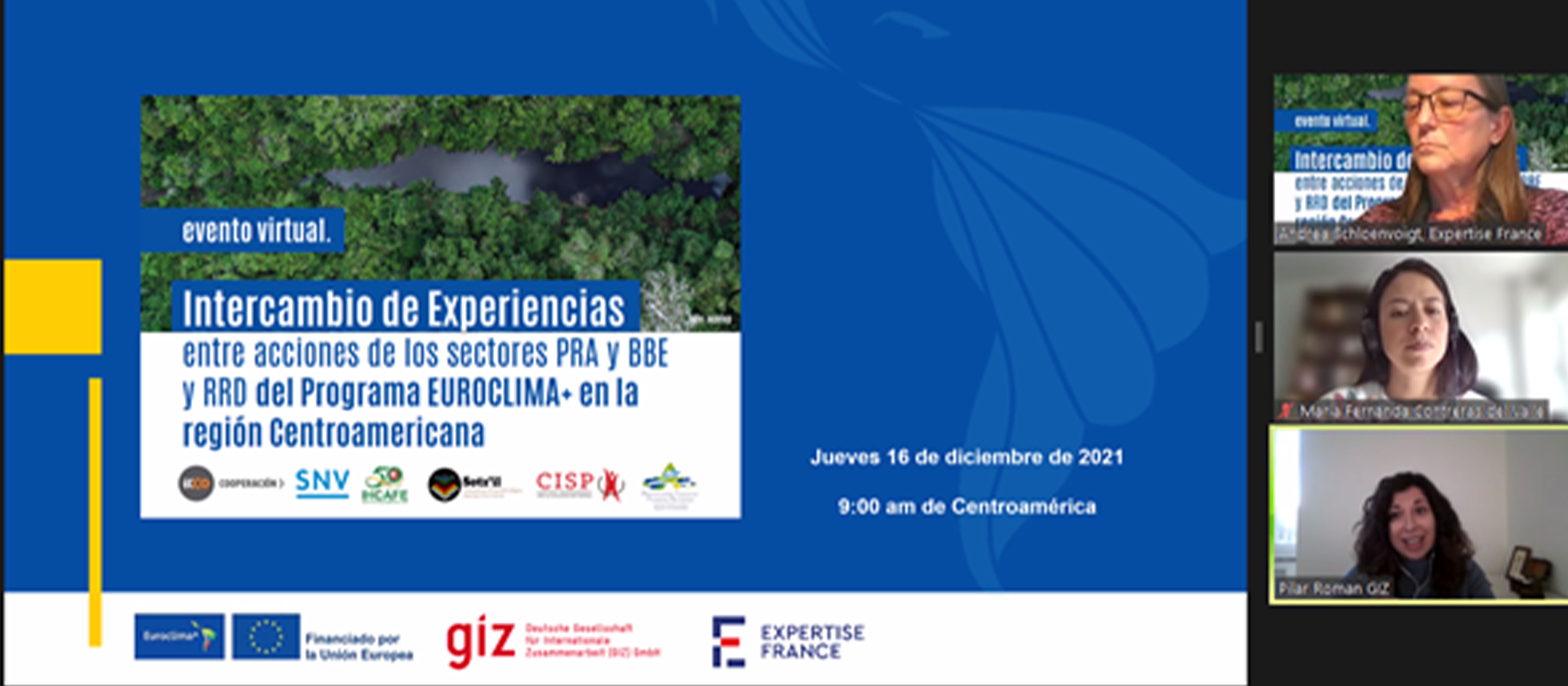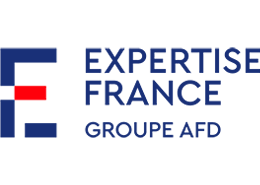Central America, 16 December 2021 - The projects supported by the EUROCLIMA+ Programme in the sectors of Resilient Food Production (RFP), Forests, Biodiversity and Ecosystems (FBE)
and Disaster Risk Reduction (DRR) in Central America shared experiences, best practices and lessons learned derived from their implementation, with a focus on South-South cooperation and as a contribution to the scaling up and enhancement of impacts.
Four project implementing organisations in the PRA sector and two in the BBE sector presented to the National Focal Points: Dr. Marlon Escoto from Honduras, Lic. Jessica Laguardia from El Salvador and Ing. Mario Mejía from Guatemala, as well as to national authorities, local actors from Honduras, El Salvador and Guatemala, project partners in Panama, Colombia and Brazil, and representatives of the EUROCLIMA+ Programme, their solutions, best practices and most important lessons learned from the implementation of the projects, which will be useful for the scaling up, impact enhancement and the sustainability of the implemented projects.
Dr. Marlon Escoto, Presidential Delegate for Climate Change in Honduras, highlighted that EUROCLIMA+ is interested in promoting projects to solve climate problems, by sharing learning and experiences. He added that he hoped that at the end of the event there would be a "toolbox" to reposition what has been done, and scale it up in time and space.
The Netherlands Development Cooperation Service (SNV) in cooperation with the Association for Integrated Watershed Management of La Paz and Comayagua (ASOMAINCUPACO) implemented the project "Climate Smart Family Farming" (AFCI - RFP) with actions in Honduras, Guatemala and El Salvador. Lic. José María Buitrago, Monitoring and Evaluation specialist of the AFCI- RFP Project presented the experience of climate inclusive finance in Honduras, a proposal for mechanisms to develop inclusive climate finance products at the territorial level.
Buitrago indicated that climate financial inclusion goes beyond seeing how financial products are offered in rural sectors, and that financing is defined as "granting resources" to address climate change, including transfers, subsidies and credit. He added that the proposed model implies a territorial approach, taking the sub or micro-basin as the basic unit of action and the ACI-RFP as the territory's productive strategy.
Eng. Douglas Benavidez, AFCI-RFP Project Coordinator, shared the scaling-up process of the project's climate action, and its potential for mobilising resources for vulnerable groups at the territorial level, starting from a climate action validated at the territorial level. He pointed out that the route was: an open design for scaling up, validation of solutions in the territory, knowledge management with the systematisation of best practices and lessons learned, and timely advice and joint construction of a Concept Note for scaling up, which has generated a favourable environment for public policy advocacy and mobilisation of climate finance.
The Honduran Coffee Institute (IHCAFE) in cooperation with the Hans R. Neumann Foundation implemented the project "Coffee landscapes resilient to climate change in the tri-national zone" covering the dry corridor of Honduras, implemented in Guatemala and Honduras. Eng. Julio Roberto Lima, Coordinator of the Tri-national Coffee Board, shared the experience of the process of setting up the Tri-national Board and its main actions and strategic plan on climate change. The engineer highlighted how governance has been built in the territory, and that the fundamental role of the Tri-national roundtable is "to be a tri-national platform, in public-private and institutional alliance for integration, dialogue, articulation, consensus and proposal that manages the development of coffee growing in the Trifinio region of El Salvador, Guatemala and Honduras".
 |
Dr. Marlon Escoto, Presidential Delegate for Climate Change in Honduras
At the opening of the session focused on El Salvador, Lic. Jessica Laguardia, EUROCLIMA+ Focal Point in El Salvador, highlighted the importance of enhancing synergies to achieve the desired scaling up in the region, and emphasised the role of strengthening local capacities to achieve the goals associated with climate actions at different scales. She also pointed out that it is necessary to address climate issues in a comprehensive manner, which has been reflected in the implementation of the projects developed in the framework of EUROCLIMA+.
ICCO Cooperation, in cooperation with the Association of Forest Communities of Petén (ACOFOP) in Guatemala, the Federation of Agroforestry Producers of Honduras (FEPROAH), the Moskitia Asla Takanka (MASTA) in Honduras and the Higher Community Counsel of the Rural Farmer Organisation of Alto Atrato in Colombia have implemented the project "Development of the project Communities, Forests and Biodiversity: Promoting dialogue, exchange and forest value chains to adapt and mitigate climate change" implemented in the four countries represented. Architect Rebeca Dávila, Project Coordinator in El Salvador, presented the experiences and lessons learned from the pilot model of reforestation with agroforestry systems for carbon sequestration and sale of certificates for the voluntary market as a green solution for forest restoration with a community approach.
Dávila listed some of the impacts and results obtained from the reforestation pilot model implemented in El Salvador, which has benefited 6 municipalities: 177,200 hectares have been reforested with fruit and forest trees, and it is the first experience with carbon certificates and commercialisation in El Salvador, with a high potential for scaling up and local sale of certificates.
For its part, the Trinational Border Community of the Lempa River (MTFRL), in cooperation with the University Centre of Oriente (CUNORI-USAC) in Honduras, the University Centre of Adamantina and the Prefeitura/Alcaldía of Adamantina in Brazil, has executed the project "Local policies and mechanisms for the articulation and implementation of public-private partnerships for resilient food production in the agri-food value chains in the Central American Trifinio and in Adamantina, Brazil". Eng. Héctor Alonso Aguirre, General Manager of MTFRL, presented the example of the Rio Lempa Company and highlighted as a key aspect of this initiative, that the entity has been transformed into a true Company for Social and Economic Solidarity; also that, to continue deepening the economic development of a territory, it is essential to integrate young people and women to participate in the development of the chain, either by generating added value or by integrating them into the marketing channels.
 |
Andrea Schloenvoigt (Expertise France), Maria Fernanda Contreras (FBE), Daniel Gallegos (CISP), Douglas Benavidez (SNV), Pilar Roman (GIZ), Marvin Chirix (Sotz'il)
The session focused on Guatemala was opened by the representative of the EUROCLIMA+ National Focal Point in this country, Eng. Mario Mejía, Director of Climate Change, Ministry of Environment and Natural Resources Guatemala (MARN). He highlighted the high value of the event by sharing the experiences of enterprises created to address the impacts of climate vulnerability.
Meanwhile, the indigenous organisation Sotz'il, the main executor of the project "Strengthening Indigenous Systems of Sustainable Food Production as resilient measures to climate change in Central America", implemented in Guatemala and Panama, presented its experience on traditional knowledge and its contributions to food security and adaptation to climate change.
Eng. Juan Cusanero Elias, coordinator of the Project in Guatemala for Sotz'il, listed some of the contributions of indigenous traditional knowledge in adaptation to climate change, highlighting: the reading of nature's signals, adjustments to production practices, seed improvement through controlled crossbreeding, seed bank model, seed exchange model between peoples or communities, Awän model (milpa system), intergenerational transfer model, traditional zoning of territorial spaces (vocation), cultural uses, and sharing traditional ways of life with the world, as a factor of resilience, territorial planning and respect for the natural environment.
Meanwhile, Lic. Onel Masardule, National Coordinator of the project in Panama for FPCI, reported that in the Guna Agricultural Production System, the Nainu system allowed the forests to be managed in a balanced way, associated with a high diversity of species (trees, shrubs, birds, insects, mammals and others). Nainu refers to an area of cultivation associated with a high diversity of plant species, both for cultural and food use, and is characterised by having tree species as an accompaniment, within or on the boundaries of the crops.
 |
Panel for the webinar
The Comitato Internazionale per lo Sviluppo dei Popoli (CISP), in cooperation with the Consejo Nacional de Áreas Protegidas (CONAP), the Asociación Cuerpos de Conservación de Omoa (CCO) and the Asociación Programas de Gestión Ambiental Local (ASOPROGAL), has developed the project " Forests, Biodiversity and Community Development Strengthening the National Management of Protected Areas in Guatemala and Honduras”. Economist Daniel Gallegos, coordinator of CISP, shared the experience on the process of conformation and governance model of management, financing and studies that support the importance of the Binational Biological Corridor Cuyamel-Omoa Punta de Manabique. In his intervention he indicated that the Wetlands - Mangroves (blue carbon) capture 1000 times more CO2 than a terrestrial forest; and that the Management Plan linked to the forestry incentive programme in Guatemala will be generating about 300 thousand Euros for the next 10 years.
The event ended with a panel of speakers and Eng. Gabriela Jiménez from the Honduran Coffee Institute (IHCAFE), in which it was concluded that there is now a wealth of solutions and lessons learned from the implementation of the actions, which can be used as a set of tools that will be more accurate and generate greater impacts in future interventions, which will contribute to the efficiency and sustainability of these actions.
It was also concluded that the solutions generated by the projects are innovative, territory-based, co-created with the communities and validated. They were implemented by bodies with social credibility and technical capital, among others.
The virtual event was organised by the Synergies group of the EUROCLIMA+ projects with the support of Expertise France and GIZ.
Pilar Román Galán, from GIZ, congratulated the Sinergias group that since the end of 2019 has promoted a space for exchange between the actions of the different EUROCLIMA+ sectors, promoting joint actions, facilitating the exchange of best practices that have built synergies between organisations and identifying future cooperation for scaling them up in Central America.
Como acciones futuras se continuará con el proceso de consolidación del grupo de Sinergias, como un espacio de intercambio, asesoramiento y cooperación para la gestión conjunta de conocimientos y movilización de recursos que promueven la implementación de acciones y estrategias bajas en carbonos y resilientes a efectos climáticos extremos en la región Centroamérica. Asimismo, se concluirá la Nota conceptual del grupo Sinergia para convertirla en una estrategia con Plan de Acción para 2022.
As future actions, the process of consolidation of the Synergies group will continue, as a space for exchange, advice and cooperation for the joint management of knowledge and mobilisation of resources that promote the implementation of low-carbon and resilient actions and strategies to extreme climate effects in the Central American region. Likewise, the Sinergia group's Concept Note will be finalised to turn it into a strategy with an Action Plan for 2022.
More information
Synergies Group for projects of EC+ in CA, Benavidez, Douglas,
This email address is being protected from spambots. You need JavaScript enabled to view it.
This email address is being protected from spambots. You need JavaScript enabled to view it.



